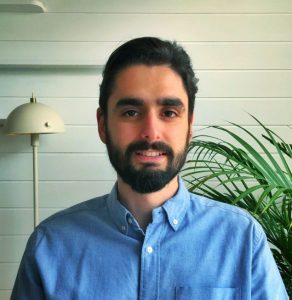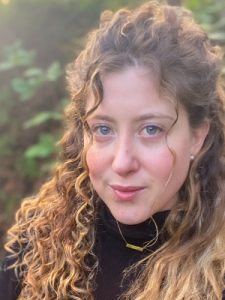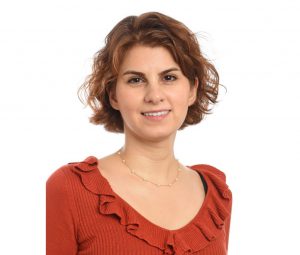The Centre's Early Career Fellowship Programme is an initiative funded by MRC designed to attract to the Centre exceptional candidates seeking to establish their own programme of research. The programme provides a unique opportunity for early-career scientists to develop the skills needed to meet future research challenges in the environment and health arena, thus seeding and strengthening the discipline both nationally and internationally.
Meet our Early Career Research Fellows

Dimitris Evangelopoulos
Dimitris’ research focuses on Biostatistics and Environmental Epidemiology, and more specifically on the impact of exposure measurement error on health effect estimation. His fellowship, entitled “Multi-Dimensional assessment of the Impact of Measurement Error on the health effect estimates of long-term exposure to air pollution (M-DIME)”, aims to quantify the true associations between multiple exposures and health, considering the complex relationship between pollutants, using simulations and real data.
The project will provide guidance to researchers on the optimal methods to measure air pollution, identify the most harmful pollutants and perform a health impact assessment to quantify the deaths attributed to air pollution and how this affects cost-benefit analysis.
He joined the Environmental Research Group in 2015 and is a member of the Air Pollution Epidemiology team. His research interests lie in Biostatistics, Environmental Epidemiology, Measurement Error Theory, Simulations and Health Impact Assessment and he is the project manager of the MELONS study. He is a co-opted member of the Quantification of Air Pollution Risk (QUARK) sub-group of the Committee on the Medical Effects of Air Pollutants (COMEAP) which provides advice to Government Departments and Agencies on how air pollution affects health. He has also acted as an external advisor of the World Health Organization and is an Office for National Statistics (ONS) Full Accredited Researcher. Dimitris completed his PhD in Environmental Sciences at King’s College London, following a Diploma in Applied Mathematics and Physical Sciences from the National Technical University of Athens and an MSc in Biostatistics from the National and Kapodistrian University of Athens.
Ricky Nathvani

Subsequently, he worked on predicting air and noise pollution levels from these sources of imagery and the objects within them. Ricky’s background was in Theoretical Particle Physics, for which he obtained his doctorate from University College London, following a Masters in Physics at the University of Oxford.
He is also a freelance popular science writer on a variety of topics, whose work can be found here: http://rickynathvani.contently.com/

Kayla Schulte
Dr. Kayla Schulte is a Postdoctoral Research Associate in the Environmental Research Group with a background in environmental social theory, participatory research, and social data science. Her research broadly explores how knowledge about local air quality is co-produced in society.
Kayla's research draws on sociological, human geography, and Science, Technology and Society (STS) theory to explore engagement with emerging mobile app, sensors and other digitally enabled sources of real-time air quality information. Her research interests include: who uses real-time air quality information systems, what motivates this use, whether exposures to air pollution are effectively reduced, and which portions of a population are most likely to experience such benefits.
Methodologically she specialises in participatory approaches to research, and how to blend quantitative and quantitative data to support more equitable air quality governance.
Kayla is PI for a Defra-funded air quality project in Barking and Dagenham. She also supports the Community Programme dimension of the Breathe London project.
Prior to joining ERG, Kayla held positions with the U.S. government (U.S. EPA) and worked on multi-stakeholder environmental research and management projects funded by Defra, BEIS, the Met Office, NERC, UKRI and ESRC, NSF, USGS and state departments of environmental protection in the USA. Kayla also serves as an advisor for local government authority projects trialling participatory air quality management methodology, specifically involving low-cost air sensor technology and new sources of digital data.
Kayla completed her doctoral research at the University of Oxford in Sociology at the Leverhulme Centre for Demographic Science in 2022. She holds MSc in Geography from the University of Oxford and a BA in Environmental Studies from Franklin & Marshall College.
Past Early Career Research Fellows
Garyfallos Konstantinoudis
Garyfallos Konstantinoudis is an MRC Skills Development Research Fellow at the Department of Epidemiology and Biostatistics, part of the MRC Centre for Environment and Health at Imperial College London. My group is the Environmental and Health Statistics group headed by Prof Marta Blangiardo. His current domain of research is on Bayesian spatiotemporal models using exact point data. He combines the aforementioned modelling framework with health economics to investigate the climate related respiratory disease burden in the England.
This project is a collaboration with Prof Gianluca Baio at UCL, Dr Cosetta Minelli at Imperial College, Dr Antonio Gasparrini at LSHTP, Dr Ana Vicedo-Cabrera at ISPM University of Bern, Prof Dominic Schuhmacher at University of Gottingen, Dr Samir Bhatt at Imperial College and Dr Joan Ballester at ISGlobal.

Before that, he did his PhD in Biostatistics and Epidemiology at the Institute of Social and Preventive Medicine (ISPM) at the University of Bern in Switzerland in the Environmental and Spatial Epidemiology group headed by Dr Ben Spycher. Also, he obtained an MSc in Biostatistics at the University of Glasgow and BSc in Mathematics at the Aristotle University of Thessaloniki.

Niloofar Shoari
Niloofar’s research is at the intersection of environmental sciences and public health, with a particular focus on the application of Bayesian methods in this area. Her current project aims to understand what makes a neighbourhood healthy, and how growing up in different neighbourhoods contributes to the improvement of health and educational outcomes in school-age children. She completed her PhD in Environmental Engineering at École de Technologie Supérieure (University of Quebec, Canada), where she worked on quantitative analysis of soil contamination data and developed guidelines for engineers and policy-makers as to how to deal with the below detection limit concentrations. She was a visiting research scholar in the Department of Statistics at the University of Waterloo and Texas A&M University. She completed her MSc and BSc in Environmental Engineering at La Sapienza University of Rome (Italy).
Hanbin Zhang
Hanbin’s research lies in the intersection between exposure science, environmental health and public policy. His fellowship project utilises an unique collaborative opportunity where two interventions (one on salt reduction and one on energy transition) took place simultaneously in northern rural China to observe the combined and individual health effects. Previously he worked as postdocs at King’s College London and Imperial College London on projects AIRLESS and MELONS where he led methodological developments in separating pollution into indoor and outdoor sources, and microenvironment tagging for personal monitoring data.
Apart from research, he acts as the education co-lead at Environmental Research Group for various teaching activities, including co-leading one undergraduate I-Explore STEMM module ‘Creating Evidence-Based Solutions to Environmental Pollution and Health’. He believes in ludic pedagogy to create an environment for students to learn from fun intrinsically – a recent example is to gamify environmental monitoring into a 8-bit sandbox game.

